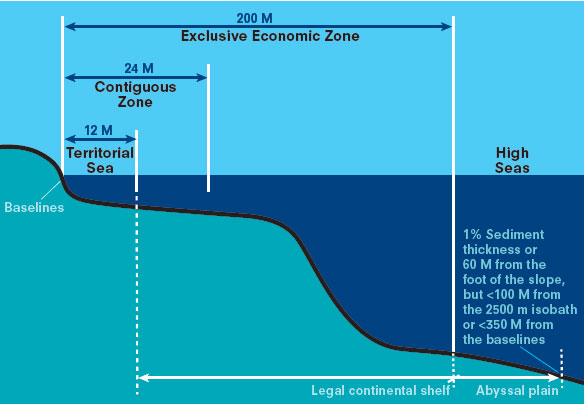India protests against US naval exercise
About UNCLOS
- The United Nations Convention on the Law of the Sea (UNCLOS), also known as the Law of the Sea Treaty, is an international treaty which was adopted and signed in 1982. The Convention was formed to ensure freedom of shipping navigation at the sea.
- The Convention has created three new institutions on the international scene :
- the International Tribunal for the Law of the Sea,
- the International Seabed Authority,
- the Commission on the Limits of the Continental Shelf.
- India is party to UNCLOS.
- UNCLOS classifies marine areas into five zones. They are:
- Territorial sea
- Contiguous zone
- Exclusive economic zone
- Continental shelf
- High Seas

Territorial sea
- According to UNCLOS, the territorial sea can be defined as the area which extends up to 12 nautical miles from the baseline of a country’s coastal state. The territorial sea is under the jurisdiction of that particular country; however, foreign ships (both merchant and military) ships are allowed passage through it.
- This type of passage of territorial passage of foreign ships is known as an innocent passage. However, the right to the innocent passage can be suspended if there is a threat to the security of the coastal state.
Contiguous Zone
- The contiguous zone can be defined as the belt which extends 12 nautical miles beyond the territorial sea limit.
- A coastal state’s control on this area is limited to prevention of actions which can infringe its customs, fiscal, and immigration laws. It can also act if any activity in the contiguous zone threatens regulations in the territorial sea.
Exclusive economic zone
- The exclusive economic zone can be defined as a belt of water which extends up to 200 nautical miles from the baseline of the coastal state. Thus it includes both territorial sea and contiguous zone.
- In the exclusive economic zone, the coastal State has:
- sovereign rights for the purpose of exploring and exploiting, conserving and managing the natural resources, whether living or non-living, of the waters superjacent to the seabed and of the seabed and its subsoil, and with regard to other activities for the economic exploitation and exploration of the zone, such as the production of energy from the water, currents and winds;
- jurisdiction as provided for in the relevant provisions of this Convention with regard to:
- the establishment and use of artificial islands, installations and structures;
- marine scientific research;
- the protection and preservation of the marine environment;
- In the exclusive economic zone, all States enjoy the freedoms of navigation and overflight and of the laying of submarine cables and pipelines, and other internationally lawful uses of the sea related to these freedoms, such as those associated with the operation of ships, aircraft and submarine cables and pipelines, and compatible with the other provisions of this Convention.
Continental Shelf
- The continental shelf can be defined as the area whose outer limit shall not exceed 350 nautical miles from the baseline or shall not exceed 100 nautical miles from the 2500 meters isobath.
- Isobath is a line connecting points of equal underwater depth.
- The coastal state has exclusive rights for exploring and exploiting its natural resources in this area. The state also has the exclusive rights to authorize and regulate drilling on the shelf for all purposes.
High Seas
- High seas can be defined as the part of the sea that is not included in the exclusive economic zone, in the territorial sea, or in the internal waters of a coastal state or archipelagic waters of an archipelagic state.
- High seas are open to all states for freedom of navigation, freedom of overflight, freedom to construct artificial islands installation, freedom of fishing, and freedom of scientific research.
Why in News?
- Recently, the US Seventh Fleet announced that one of its warships, USS John Paul Jones, had carried out a Freedom of Navigation operation west of Lakshadweep Islands, “inside India’s exclusive economic zone, without requesting India’s prior consent, consistent with international law”.
- Responding to this public announcement by the US Navy, India conveyed its concerns regarding the passage to the Government of USA through diplomatic channels. It is seen as a rare row between the friendly navies of the two countries.
- The Government of India’s stated position on UNCLOS is that the Convention does not authorise other States to carry out in the Exclusive Economic Zone and on the continental shelf, military exercises or manoeuvres, in particular those involving the use of weapons or explosives, without the consent of the coastal state.
- Under Indian law — The Territorial Waters, Continental Shelf, Exclusive Economic Zone and Other Maritime Zones Act, 1976 — “all foreign ships (other than warships including submarines and other underwater vehicles) shall enjoy the right of innocent passage through the territorial waters” and a passage is innocent “so long as it is not prejudicial to the peace, good order or security of India”.
- “Foreign warships including submarines and other underwater vehicles may enter or pass through the territorial waters after giving prior notice to the Central Government,” the law states.
Reference:
Subscribe
Login
0 Comments
